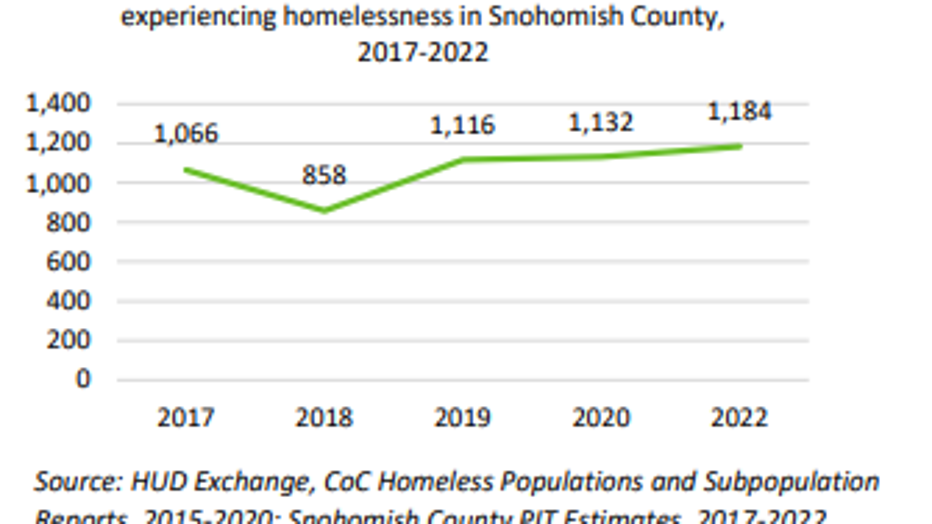Homelessness, food security issues highlighted in new data from Snohomish County
EVERETT, Wash. - A new community health report from Snohomish County is uncovering troubling trends ranging from an increase in the county’s homeless population to residents’ ability to put healthy food on the table.
Released this week, the 2022 Community Health Assessment reviews 200 health-related indicators.
Highlighted in this report is the annual Point-in-Time count, which showcased the highest number of people experiencing homelessness since 2012, though it notes a one-time count has limitations.

Point-in-Time snapshot in Snohomish County between 2017 and 2022. The Snohomish County Health Department notes, "Due to inherent limitations of PIT counts (e.g., weather, targeted but not comprehensive canvassing, etc.), this snapshot should be inter
Penelope Protheroe, the president of Angel Resource Connection (ARC), told FOX 13 that the homeless population is struggling – and that the face of homelessness is changing.
Protheroe is on the street every week delivering hot meals, blankets, clothing and sleeping bag to those in need. Her group regularly pays for gas for people who are living out of vehicles – a necessity when hot weather days arrive.
"It’s not the normal view of homeless of what people think," she said. "It’s really coming down to people that have faced hardship. Good, hard-working people where something happened."
Since COVID -19 hit, Protheroe has witnessed people lose homes and fall behind on bills. On Thursday, we met up with her at an Everett McDonald’s where she was delivering sleeping bags to three individuals who are living out of a van with their dogs.
Aaron and Debra Roberts are married. Debra’s ex-husband, Jacob, lives with them. They've spent nights sleeping on bike trails and in the woods because their van has broken down, and because many places won’t allow you to park overnight.
Debra Roberts said they’ve faced challenges. She’s a recovering addict, but notes: her husband has never taken a drug in his life – they live on the streets, but have been fighting to find a better life.
"People look at me like I’m a junkie or something," said Roberts. "It’s not like that. They’re judging us before they get to know us – we’re all treated the same. A lot of homeless don’t have a choice. If you lose an income, a job or something you’ll lose your home."
According to Protheroe, it’s hard to get good meals to individuals too.
Recently, the City of Everett granted new powers to the mayor to expand current "no sit, no lie" policies.
Mayor Cassie Franklin was granted those powers in early May. At the time, she said that it would allow the city to ensure safe access for people serving individuals in need – there is hope that it will also appease communities that have pushed back on proposed sites.
"Finding a suitable location for a service provider, whether it’s addiction treatment or a shelter, can be incredibly difficult, partially because the conduct that we’ve seen near certain sites," she wrote.
Protheroe believes the actions are only confusing individuals – making it harder to deliver services at all.
"They’re pushing people away that need the help most," she said, arguing that we’re painting the region’s homeless problem with too broad a brush.
"There are laws that are wrong, that shouldn’t have been made law. It’s wrong, so there’s a deeper conviction in me to help the homeless."
The homeless numbers aren’t the only concern raised in the 2022 Community Health assessment released this week.
According to the report, 1 out of every 11 Snohomish County residents are food insecure. That’s described as, "a lack of consistent access to enough food for every person in a household to live an active, healthy life."
An executive summary of the report found that the top health priorities include: persons experiencing homelessness, mental health access, opioid overdoses, adverse childhood experiences, inadequate prenatal care and food security
One high school student told researchers, access to mental health was problematic: "Even if you try to seek help outside of school, you have to pay some kind of money to see somebody. Or an online program to even Zoom someone for 10 minutes, you have to pay. And that is ridiculous because you shouldn’t have to pay for something that is really important to your mental health. It’s just not accessible at all."
For more information on the current health assessment of Snohomish County, you can access the full report here.


